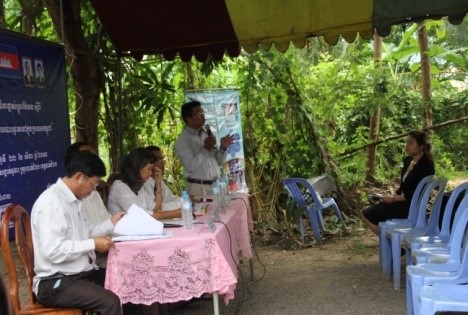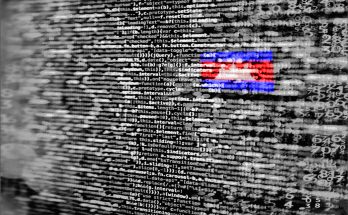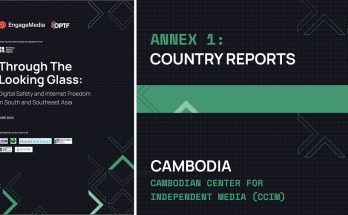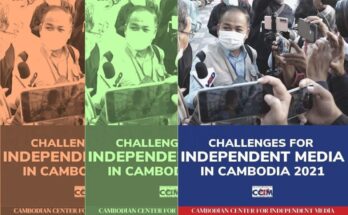Promoting Investigative and Independent Reporting to Improve Electoral Process
 On Thursday 22nd August 2013, The Cambodian Center for Independent Media (CCIM), with the generous support of the Swedish International Development Cooperation Agency (SIDA), conducted a forum in Battambang province to address a number of issues pertaining to freedom of expression following the national assembly elections in Cambodia. This was the fifth in a series of forums that have also been conducted in Phnom Penh, Kandal, Takeo, and Kampong Cham. However, this forum was the first of two post-election forums to be held in Battambang and Prey Veng respectively.
On Thursday 22nd August 2013, The Cambodian Center for Independent Media (CCIM), with the generous support of the Swedish International Development Cooperation Agency (SIDA), conducted a forum in Battambang province to address a number of issues pertaining to freedom of expression following the national assembly elections in Cambodia. This was the fifth in a series of forums that have also been conducted in Phnom Penh, Kandal, Takeo, and Kampong Cham. However, this forum was the first of two post-election forums to be held in Battambang and Prey Veng respectively.
The forum was intended as a peaceful platform for citizens to voice concerns about the electoral proceedings, with the aim of providing citizens with the opportunity to issue recommendations to the National Election Committee (NEC) and local government officials. Unfortunately, a strong police presence overshadowed the day’s events, with local authorities attempting to ban the forum from taking place under the false charge that the event was illegal and proper permission had not been obtained.
Officers in riot uniforms carrying batons and shields formed a blockade at the entrance, and this lead to conflict between officers and villagers trying to join the forum, with some citizens being hit with batons and sustaining minor injuries. This blatant attack on freedom of expression underlines exactly why there is a need to open up public discourse about democracy and freedom of expression in Cambodia.


For those who were able to attend, the meeting provided the opportunity for the public to express their views on the situation of freedom of expression, provide feedback on their understanding of democratic systems and the electoral proceedings, as well as to hear from expert guest speakers who shared their knowledge and experiences.
Guest speakers included: Mrs. Mou Sokhour, representative from Cambodia National Rescue Party (CNRP); H.E. Suor Chandeth, Sam Rainsy Party Senate member in Battambang province; Sam Vong Dara, Omal commune representative in Battambang province; and Mr. Som Kuntheamy, from the Neutral and Impartial Committee for Free and Fair Elections in Cambodia (NICFEC). Mr. Kim Chourng, Orchar Commune Chief was also invited to speak at the forum but declined due to fear for his safety.
A representative from the Committee for Free and Fair Election in Cambodia (Comfrel) was also invited to participate but was unable to join. The National Election Committee (NEC) and the Cambodia People’s Party (CPP) declined an invitation to attend the forum.
Observational data collection suggested there were 60 forum attendees, including 20 female, all from the Ou Ja District, Battambang province. In addition, approximately 300 citizens attempted to join the forum but were prevented from doing so by police.
The heavy police presence seemed to set the tone for the guest speakers’ public addresses. H.E. Suor Chandeth (CPRP) spoke of alleged corruption during the election, as well as the challenges his party faced in promoting the CNRP due to resistance from the ruling party.
Commenting on the police presence at the forum, H.E. Suor Chandeth tried to reassure nervous audience members, saying “Please do not worry because we have the right to do [this forum].” “People have a right to explain their ideas and concerns about the election… what we’re doing are not wrong in the law.”
 Mrs. Mou Sokhour (CNRP) spoke about civilians allegedly being harassed by the NEC. Other topics raised by guest speakers included fraudulent election-day conduct such as the changing of party names on ballet boxes, as well as political discrimination.
Mrs. Mou Sokhour (CNRP) spoke about civilians allegedly being harassed by the NEC. Other topics raised by guest speakers included fraudulent election-day conduct such as the changing of party names on ballet boxes, as well as political discrimination.
Speeches were followed by questions and feedback from audience members who shared the challenges they faced in voting, described alleged eye-witness accounts of corruption in the electoral process, and provided more general thoughts about the elections and the forum.
One male participant alleged he wasn’t allowed to vote under the pretence of not having adequate identification whilst another concerned female participant made a request for peace. About 50% of all audience members raised their hands when asked if they felt scared because of the police presence.
Audience member Mr. Roth Soeun said he voted for every mandate, but last year during the commune council election he missed voting because he went to work far from his hometown. And this year he was not able to vote because he couldn’t find his name in the voter list. He felt very sad to miss out on voting again.
Mrs Mou Sochua from CNRP responded, citing Cambodian constitutional law Article 34 (electoral rights), that “all citizens have the right to vote”, and that the NEC have to make voting easier so that citizens can vote where ever they live which would make elections more fair. Non-government organisations present at the forum included The Cambodian League for the Promotion and Defense of Human Rights (LICADHO), The Cambodian Human Rights and Development Association (ADHOC), and the United Nations for Human Right (UNOHCHR).
The media provided coverage of the forum proceedings. Certain media organisations incorrectly reported that the event was staged by the opposition party.
Voice of America’s (VOA) story ‘Police fail to block opposition public forum in Battambang’ (22 August, 2013) detailed the day’s event, but wrongly credited the CPRP as the event organiser, when in fact it was organised by CCIM in conjunction with SIDA.
Similarly, a story by the Cambodia Daily, ‘Police block entrance to opposition’s Battambang forum’ (23 August, 2013) also featured some inaccurate information, including the purpose of the forum, which was to address the public’s electoral concerns and educate about democracy, rather than to simply discuss alleged election irregularities. It also incorrectly stated that it was organised by Ms. Mu Sochua, a senior CNRP lawmaker.
Radio Free Asian (RFA) reported that guest speaker Ms. Mu Sochua was ruffled in the clash between villagers and police in the article ‘Police Battambang ban’ (22 August, 2013) . The article also states that police reject these claims.
The Phnom Penh Post published a story online entitled Forum leads to clashes (23 August, 2013) , outlining the forum proceedings and featuring accounts from both guest speakers, CCIM staff and a representative of the Battambang police. In the article, Battambang police chief Thuch Ra maintains that the CCIM forum was illegal:
Thuch Ra, Battambang town police chief, defended his officers’ conduct, saying they had simply tried to control “trouble makers”.
“They did not ask permission from the provincial level,” he said. “They asked for it from the commune – which said it did not have the capacity to allow it. So our force told people it was illegal and did not allow them to take part.”
Following this story, The Cambodian Center for Human Rights (CCHR) immediately released a press statement publicly condemning the actions of police and refuting claims by authorities:

They claimed that the forum was not permitted by law, as the organizer had not asked for authorization in advance. No such authorization for the organization of public trainings and forums is required under Cambodian law.
CCHR also cited Article 41 of the Constitution of the Kingdom of Cambodia and the International Covenant on Civil and Political Rights, Article 21, ratified by Cambodia in 1992, which guarantee the right to freedom of expression.
VOD featured two articles on its website www.vodhotnews.com, as well as exclusive video footage and images. The reports were titled ‘Battambang provincial authorities prevent people from participating in a forum on the election’ (22 August 2013) and ‘CCHR condemns the authorities in Battambang prevent public performance people’ (August 24, 2013).
A post-forum survey was conducted by CCIM staff to determine the effectiveness of the forum and collate demographic data. There were 38 survey participants (66% male, 34% female), spanning a wide cross-section of age brackets between 20 and 50+, with the majority (34%) sitting in the 50+ age bracket. No one under the age of 20 participated in the survey, suggesting poor forum attendance in this demographic.
The survey data indicated that 97% of participants felt that the forum was important for them, 100% were satisfied with the guest speakers, 89% claimed they were going to follow up issues raised in the forum, 74% said they learned something about democratic electoral procedures, and 92% said that they learned about their civic rights.
100% of survey respondents said that they did not initially feel free to express their political opinion or share their concerns, but did feel comfortable after joining the forum.
Overall, there was an overwhelmingly positive response from participants regarding the effectiveness of the forum, with feedback suggesting objectives to educate about democracy and civic rights, as well as address concerns about the election, had been met.




